I just got finished reading this stellar article about Nigerian English and how it’s misunderstood by Tech-Americans.
I also got done going through a codebase and scrubbing it of some Indian English, little things like
“Please check if topology is valid or try again after sometime.”
There’s nothing wrong with that error message, it’s perfectly understandable, it’s just not what you expect from the dialect of English I think of as American Tech. I rendered that as
“Please check that the topology is valid. Wait and try again later.”
Again, it’s not exactly deathless prose, but it wouldn’t surprise you to see it in software.
I think that what is happening is that, as usual, people who are incurious about the rest of the world assume that their normal is THE normal. Because they are mostly-white dudes working in technology, American Tech is their native dialect and they never have to code switch, and are, in fact, offended by the idea of situational code-switching. The rest of us do have to code switch, or alter formality registers, or talk nice for work. I also don’t talk the same around my parents as around my peers. This doesn’t bother me – it’s just how language works for me, even though I’m monolingual.
American Tech English, is, I think, a kind of constructed English, similar to Simplified English. It’s not quite as rigorously enforced as Simplified English, but I am one of its enforcers. I will strip nuance out of sentences, and prioritize simple grammatical structure over fluidity, pacing, or rhythm. If a sentence could possibly be two simpler sentences, I will chop it up. I will ruthlessly constrain my vocabulary, especially around the non-technical parts of writing. “Select” and “Choose” mean different things, and I will use them consistently and boringly.
I could write more beautifully, more fluently, more ecstatically. But what would be the good of that? I am not here to make you appreciate any of the poetry in my technical writing. I am here to get you through technical documentation as clearly and cleanly as possible. I want that writing to be clear and flavorless, because everything that makes writing interesting makes it harder to read. I have this searing memory of having written my second technical document (the first was a guide to PINE), and the Russian who was trying to follow my instructions being utterly confused by me writing “the shinbone is connected to the ankle bone” when I was talking about associating MIDI notes with each other. It was cute to an American, it was frustrating and unpleasant to her.
Oh.
It’s not that I don’t love language – I do. The featured image is one panel of a much larger bookshelf, and it’s far from the only bookshelf in my house, and I know for a fact that I have read every book here. I love language enough to have several Englishes, and none of them is as unctuous and fizzling as the examples of Nigerian Englishes in that article. I don’t want to lose that English, or proclaim it fake. It’s real, it’s not a computer, it’s just different. It makes me think of Shirley cards, where color film originally biased heavily toward people with light skin. Our new “AI checkers” are yet another iteration of that, because whitish technology people are not thinking about there being anyone different.
I’ll keep writing my colorless, tasteless, distilled water tech writing, but I’m so glad that someone out there is doing something else.

